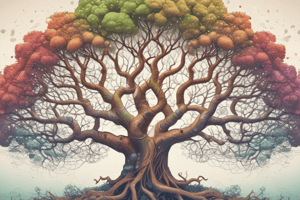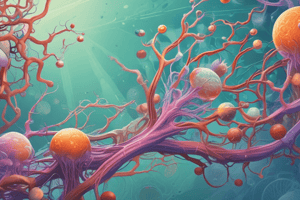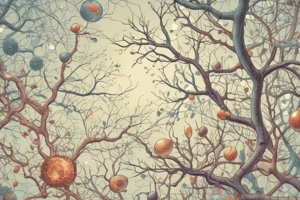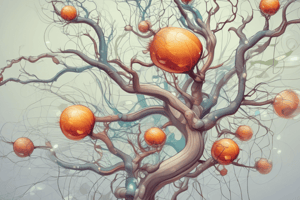Podcast
Questions and Answers
What is the study of the interactions between organisms and their environment?
What is the study of the interactions between organisms and their environment?
- Botany
- Biochemistry
- Microbiology
- Ecology (correct)
Which organelle is responsible for generating energy in a cell?
Which organelle is responsible for generating energy in a cell?
- Mitochondria (correct)
- Cytoplasm
- Plasma membrane
- Nucleus
What is the process by which cells convert energy and nutrients into biomass?
What is the process by which cells convert energy and nutrients into biomass?
- Evolution
- Homeostasis
- Metabolism (correct)
- Adaptation
Which biological molecule provides energy for the body?
Which biological molecule provides energy for the body?
What is the study of the evolution of species over time?
What is the study of the evolution of species over time?
Which system transports oxygen and nutrients to cells?
Which system transports oxygen and nutrients to cells?
What is the process by which cells generate energy from nutrients?
What is the process by which cells generate energy from nutrients?
What is the study of the structure, function, and processes of cells?
What is the study of the structure, function, and processes of cells?
Flashcards are hidden until you start studying
Study Notes
Branches of Biology
- Botany: study of plants
- Zoology: study of animals
- Microbiology: study of microorganisms (bacteria, viruses, etc.)
- Ecology: study of interactions between organisms and their environment
- Biochemistry: study of chemical processes in living organisms
- Molecular Biology: study of biological processes at the molecular level
- Genetics: study of heredity and variation
- Evolutionary Biology: study of the evolution of species over time
Cell Biology
- Cell structure:
- Plasma membrane: outer layer of the cell
- Cytoplasm: jelly-like substance inside the cell
- Nucleus: contains genetic material (DNA)
- Mitochondria: powerhouses of the cell (generate energy)
- Cellular processes:
- Photosynthesis: process by which plants convert sunlight into energy
- Respiration: process by which cells generate energy from nutrients
- Cell division: process by which cells reproduce (mitosis, meiosis)
Organ Systems
- Nervous system: controls and coordinates body functions
- Circulatory system: transports oxygen and nutrients to cells
- Respiratory system: brings oxygen into the body and removes carbon dioxide
- Digestive system: breaks down and absorbs nutrients from food
- Endocrine system: produces and regulates hormones
- Immune system: defends the body against pathogens and disease
Biological Molecules
- Carbohydrates: provide energy for the body (sugars, starches, fibers)
- Proteins: build and repair tissues (enzymes, hormones, structural proteins)
- Lipids: provide energy and structure (fats, oils, cholesterol)
- Nucleic acids: contain genetic information (DNA, RNA)
Biological Processes
- Metabolism: process by which cells convert energy and nutrients into biomass
- Homeostasis: process by which the body maintains a stable internal environment
- Adaptation: process by which organisms adjust to changes in their environment
- Evolution: process by which species change over time through natural selection and genetic drift
Branches of Biology
- Study of plants is known as Botany
- Zoology is the study of animals
- Microbiology is the study of microorganisms like bacteria, viruses, etc.
- Ecology is the study of interactions between organisms and their environment
- Biochemistry is the study of chemical processes in living organisms
- Molecular Biology is the study of biological processes at the molecular level
- Genetics is the study of heredity and variation
- Evolutionary Biology is the study of the evolution of species over time
Cell Biology
Cell Structure
- Plasma membrane is the outer layer of the cell
- Cytoplasm is a jelly-like substance inside the cell
- Nucleus contains genetic material (DNA)
- Mitochondria are the powerhouses of the cell (generate energy)
Cellular Processes
- Photosynthesis is the process by which plants convert sunlight into energy
- Respiration is the process by which cells generate energy from nutrients
- Cell division is the process by which cells reproduce (mitosis, meiosis)
Organ Systems
- Nervous system controls and coordinates body functions
- Circulatory system transports oxygen and nutrients to cells
- Respiratory system brings oxygen into the body and removes carbon dioxide
- Digestive system breaks down and absorbs nutrients from food
- Endocrine system produces and regulates hormones
- Immune system defends the body against pathogens and disease
Biological Molecules
- Carbohydrates provide energy for the body (sugars, starches, fibers)
- Proteins build and repair tissues (enzymes, hormones, structural proteins)
- Lipids provide energy and structure (fats, oils, cholesterol)
- Nucleic acids contain genetic information (DNA, RNA)
Biological Processes
- Metabolism is the process by which cells convert energy and nutrients into biomass
- Homeostasis is the process by which the body maintains a stable internal environment
- Adaptation is the process by which organisms adjust to changes in their environment
- Evolution is the process by which species change over time through natural selection and genetic drift
Studying That Suits You
Use AI to generate personalized quizzes and flashcards to suit your learning preferences.




